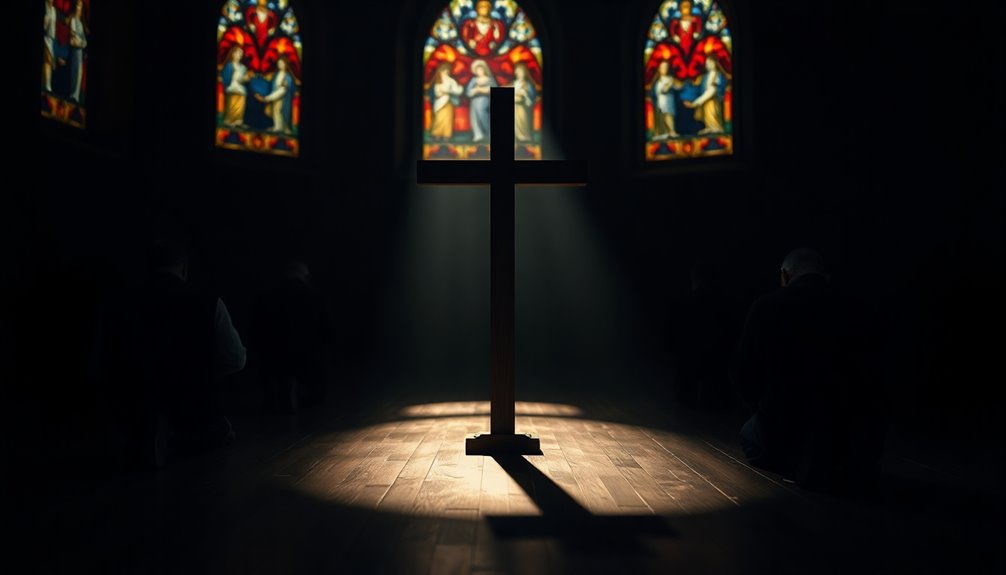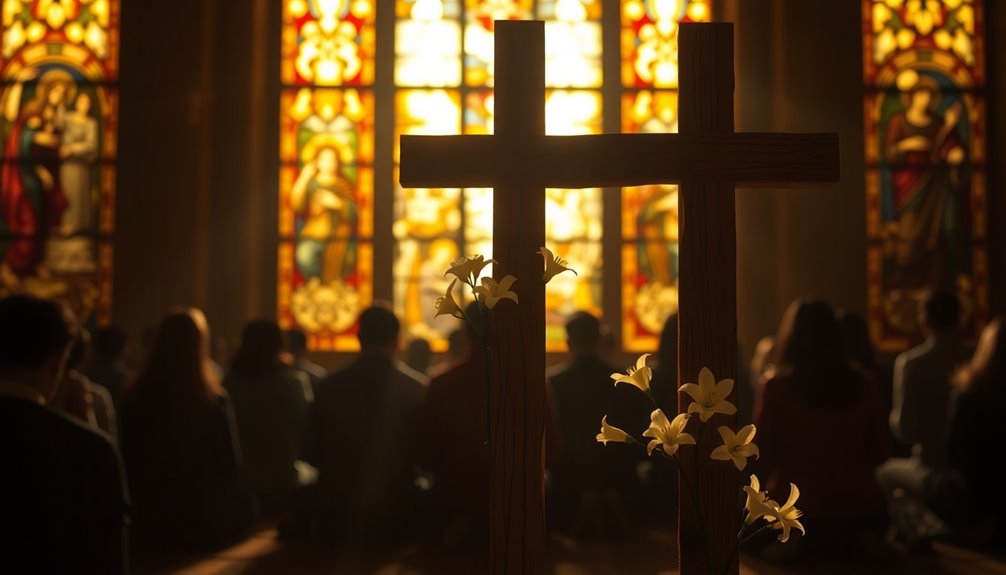Jesus died for you as a profound act of love to reconcile you with God. His sacrifice addresses the problem of sin and fulfills Old Testament prophecies. By offering Himself as the perfect atonement, He provides a path to eternal life and protects you from divine judgment. This isn't just a tragic event; it's essential for your forgiveness and restoration. The Jewish sacrificial system points to His role, presenting Him as the ultimate "Lamb of God." Discovering the deeper significance of His death can transform your understanding and relationship with God.
Key Takeaways
- Jesus died to atone for humanity's sins, fulfilling Old Testament prophecies and satisfying divine justice, as sin requires accountability (Romans 6:23).
- His sacrifice serves as an expression of God's profound love, offering reconciliation between God and humanity (Romans 5:8).
- Jesus' death parallels the Jewish sacrificial system, symbolizing the ultimate sacrifice for sin and providing a permanent solution (Leviticus 16-17).
- By believing in Jesus and His sacrifice, individuals can escape divine judgment and gain eternal life (John 3:16).
- Daily practices of forgiveness and community worship reflect the transformative grace of Jesus' sacrifice, promoting spiritual and emotional well-being.
Introduction

When you think about the significance of Jesus' death, it's essential to understand its profound impact on humanity. His sacrifice wasn't just a historical event; it was a transformative act of love that addressed the problem of sin. According to Romans 6:23, the penalty for sin is death, and Jesus took that penalty upon Himself. He became the perfect sacrifice, sinless and blameless, to bear the weight of humanity's transgressions.
This act of love fulfilled Old Testament prophecies, creating a bridge for reconciliation between God and humankind, as highlighted in Romans 5:8. Jesus' crucifixion wasn't merely a tragic end; it was a necessary fulfillment of divine justice, demonstrating that sin demands accountability. His death satisfied God's justice, showing that sin can't go unpunished.
Moreover, the annual commemoration of Jesus' death during Passover connects Him to the sacrificial system, symbolizing deliverance from sin and death. By recognizing Jesus as the Lamb of God, you can truly appreciate the depth of His sacrifice and the love that motivated it.
Understanding these elements helps clarify why Jesus' death remains central to the Christian faith.
Scriptural Basis for Sacrifice

When you look at the scriptures, you'll find powerful references that explain why Jesus' sacrifice was necessary.
Key passages in both the Old and New Testaments highlight His role as the ultimate atonement for our sins.
Understanding these biblical foundations can deepen your appreciation for the significance of His death.
Primary Bible References
Throughout history, the Bible provides profound insights into the significance of Jesus' sacrifice. Romans 6:23 states that the penalty for sin is death, highlighting the necessity of Jesus' death to atone for the sins of humanity and facilitate forgiveness and reconciliation with God.
John 3:16 emphasizes God's love for the world, showcasing that He gave His only Son, so that anyone who believes in Him will have eternal life. This belief is central to understanding the purpose of Christ's sacrifice.
Isaiah 53:5-6 prophesies that the Messiah would be wounded for our transgressions, indicating that Jesus' suffering and death were foretold as the ultimate act of atonement for our sins.
In 1 John 2:2, we see that Jesus is the atoning sacrifice for our sins, not just for a select few but for the entire world, reinforcing His death's universal significance.
Ephesians 1:7 reiterates this by stating that through His blood, we gain redemption and the forgiveness of sins, underscoring how crucial Jesus' death is for our salvation and grace.
Through these verses, you can grasp the depth of the sacrifice made for you.
Secondary Bible References
Understanding the scriptural basis for Jesus' sacrifice reveals profound truths about God's plan for redemption. In Isaiah 53, the prophet foretells the suffering servant who bears our iniquities, illustrating the concept of vicarious atonement. This passage lays the foundation for understanding Christ's sacrifice as a perfect sacrifice, meant to take upon Himself the weight of our sin for us.
The Apostle Paul, in Romans 5:8, emphasizes God's love by declaring that "while we were still sinners, Christ died for us." This highlights the sacrificial nature of Jesus' death, underscoring the depth of divine love that prompted His atoning sacrifice.
Moreover, Hebrews 9:22 reminds us that "without the shedding of blood, there's no forgiveness," affirming the necessity of Christ's sacrifice for our redemption.
John 1:29 identifies Jesus as "the Lamb of God, who takes away the sin of the world," linking Him to the Passover lamb of the Old Testament.
Finally, 1 John 2:2 proclaims that Jesus is the atoning sacrifice for our sins, emphasizing the universal scope of His redemptive work. Through these secondary references, you see the profound significance of Jesus' sacrifice in fulfilling God's divine plan.
Jewish Sacrificial System Significance

The Jewish sacrificial system, particularly outlined in Leviticus 16-17, plays a crucial role in understanding the significance of Jesus' death. This system involved offering spotless animals to atone for the sins of the people, symbolizing repentance and the desire for reconciliation with God.
On the Day of Atonement (Yom Kippur), the scapegoat carried the community's sins into the wilderness, illustrating sin's removal from the people. Each sacrifice served as a temporary measure, ultimately pointing to the need for a perfect and final sacrifice, which Christians believe is fulfilled in Jesus Christ.
The rituals surrounding the tabernacle and temple emphasized access to God's presence through these sacrifices, reinforcing the understanding of holiness and the consequences of sin.
Jesus is often referred to as the "Lamb of God" in the New Testament, signifying His role as the ultimate sacrificial lamb. His death and resurrection provide a permanent solution to sin, transcending the limitations of the previous system.
Theological Significance of Atonement

Recognizing the Jewish sacrificial system sets the stage for grasping the theological significance of atonement through Jesus. Jesus dying on the cross serves as the ultimate fulfillment of this system, where the blood of innocent lambs symbolized atonement for sin. Christ's sacrifice parallels the Passover lamb, embodying the purity and innocence necessary to satisfy God's justice (Exodus 12:21-27; John 1:29).
The Apostle Paul emphasizes that through Jesus' death, God demonstrates profound love for humanity, offering reconciliation (Romans 5:8). This act of atonement is essential because it underscores the severity of sin and the necessity of divine justice, as seen in Hebrews 9:22.
You can see how Jesus' death addresses the separation caused by sin and death, providing a pathway for forgiveness and restoration.
Moreover, Jesus' resurrection confirms the effectiveness of His sacrifice, assuring you of the hope of eternal life through faith in Him (Romans 6:4).
Ultimately, understanding the theological significance of atonement reveals the depth of God's love and the transformative power of Christ's sacrifice in your life.
Misunderstanding Jesus' Sacrificial Purpose

You might think of Jesus' death as just a historical moment, but it's crucial to understand its deeper purpose in God's divine plan for reconciliation.
Many people question the fairness of divine justice, leading to misconceptions about whether His sacrifice was necessary or optional.
Debunk Common Misconceptions
Misunderstandings about Jesus' sacrificial purpose often cloud the profound significance of His death. Many people mistakenly see His crucifixion as just a tragic event instead of recognizing it as a necessary act of atonement for humanity's sins. Jesus died for our sins, fulfilling Old Testament prophecies and enacting a divine plan for redemption.
It's crucial to understand that this wasn't an arbitrary punishment from God; rather, it was a profound expression of God's love for us.
Some overlook the theological depth of substitutionary atonement, which highlights Jesus as a sinless sacrifice. This misunderstanding leads to the false belief that forgiveness can come without acknowledging the serious consequences of sin. However, Scripture makes it clear that blood must be shed for forgiveness.
Lastly, some think faith in Jesus' sacrifice is optional for salvation, but that's not what the Bible teaches. Acceptance of His grace is essential for reconciliation with God; you can't bypass this vital step.
Skepticism About Divine Justice
Amidst the discussions about Jesus' sacrificial purpose, skepticism about divine justice often arises. Many people misunderstand the concept of substitutionary atonement, viewing Jesus' death as an unjust punishment rather than a necessary sacrifice for forgiveness. They question how an all-loving God could require such a blood sacrifice, not realizing that the sacrificial system in the Old Testament foreshadowed Jesus as the innocent Lamb of God.
Critics often overlook that Jesus died for our sins to satisfy divine justice while showcasing God's love. Romans 5:8 reminds us that Christ died for us while we were still sinners. This perspective emphasizes that His death was part of God's redemptive plan, as prophesied in Isaiah 53, which describes the suffering servant bearing our iniquities.
Skeptics misinterpret the nature of sin and its consequences, failing to grasp that without a means of atonement, we'd remain eternally separated from God due to sin's penalty.
Embracing the truth that Jesus' sacrifice fulfills divine justice helps reconcile the apparent contradiction between God's love and the need for atonement, illuminating the profound nature of His sacrifice for our forgiveness.
Faith in Daily Choices

In your daily life, practicing forgiveness can be a powerful way to reflect your faith and Jesus' teachings.
When you gather with others for group prayer, you create a supportive environment that strengthens your commitment to forgiveness.
These choices not only align with God's will but also deepen your relationship with Him and those around you.
Daily Forgiveness Practices
Embracing daily forgiveness practices is essential for living out your faith and reflecting Jesus' love in your life. Understanding that Jesus died for our sins lays the groundwork for you to forgive others, embodying God's love and grace.
Start each day with prayer and self-reflection, acknowledging your own imperfections and the need for forgiveness. This practice fosters humility and compassion, enabling you to approach others with kindness.
Incorporating acts of kindness and reconciliation into your daily routine exemplifies Jesus' teachings on forgiveness. When you choose to let go of resentment, you not only align with Christian principles but also enhance your emotional well-being.
Daily forgiveness practices can transform your relationships, making them healthier and more meaningful. Regular participation in community worship reinforces the importance of forgiveness.
Surrounding yourself with fellow believers reminds you of Jesus' sacrifice and its impact on your interactions. By embracing these practices, you create an environment where forgiveness flourishes, allowing you to truly reflect His love and grace in your life.
Group Prayer for Forgiveness
Group prayer for forgiveness plays a vital role in fostering a sense of community as you collectively seek divine mercy. When you gather with others to pray, you acknowledge both personal and communal sins, reinforcing your shared responsibility in the journey toward forgiveness.
This collective experience allows you to reflect on your daily choices, holding each other accountable while offering support rooted in God's love for us. As you pray together, you create an environment of openness where struggles can be shared, and guidance sought.
It's a space where you can express your need for strength to resist temptation and make decisions that reflect Jesus' teachings. Incorporating scriptural references, like 1 John 1:9, reminds you that confession and repentance are essential steps toward receiving forgiveness and grace.
In these group prayer sessions, you not only seek forgiveness but also encourage one another to grow in faith. The practice emphasizes the practical application of your beliefs, helping you align your daily choices with the teachings of Jesus. Additionally, this process can also enhance your ability to practice emotional regulation, which is crucial for maintaining healthy relationships and resilience in your spiritual journey.
Ultimately, group prayer for forgiveness enhances your connection with God and strengthens the bonds within your community.
Final Thoughts on Sacrifice

Jesus' sacrifice stands as a profound testament to love and redemption, inviting you to reflect on its significance in your life. When Christ died, He didn't just face the agony of the cross; He embodied God's love in the most powerful way possible. This act of sacrifice highlights the depth of forgiveness available to you.
Through His death, Jesus took upon Himself the penalty for sin, offering you a path to escape divine judgment. The grace that flows from His sacrifice is abundant, surpassing any transgressions you might face. It's a reminder that no matter how far you stray, God's love is always there, drawing you back into His embrace.
By understanding the necessity of Jesus' sacrifice, you grasp the beauty of His mercy and justice. As you commemorate His death, especially during events like Passover, remember that it symbolizes freedom from sin and death, much like the Passover lamb.
This reflection not only reinforces your faith but also encourages a deeper appreciation for the transformative power of grace offered through belief in Christ. Embrace this gift and let it impact your life profoundly.
Additional Resources

A wealth of resources is available to help you explore the profound significance of Jesus' death and its implications for your faith. Numerous online videos and podcasts delve into the theological implications of His sacrifice, providing insights into how it relates to humanity's salvation.
You'll find articles by theologians and scholars that connect Jesus' crucifixion to Old Testament prophecies, enhancing your understanding of the broader narrative of redemption.
Participating in interactive Bible study groups can further enrich your grasp of the themes surrounding Jesus' death, particularly concerning divine justice and atonement. These discussions can illuminate why His sacrifice was necessary and how it fulfills God's plan for humanity.
Moreover, consider using study guides and books that focus on the nature of sin and the concept of atonement. These resources can deepen your comprehension of the reasons behind Jesus' crucifixion.
Finally, engaging in online forums and discussion platforms allows you to share perspectives and questions with other believers, fostering a community of exploration into the meaning and impact of Jesus' death.
Embrace these resources to strengthen your faith and understanding.
Frequently Asked Questions
Why Did God Want Jesus to Die for Us?
God wanted Jesus to die for you because He loves you deeply and desires a relationship with you.
Jesus' death serves as a powerful demonstration of divine justice and mercy, bridging the gap created by sin.
By accepting this sacrifice, you can experience forgiveness and eternal life.
It fulfills the plan God set in motion, showing that reconciliation and grace are available to you if you choose to embrace it.
What Was the Purpose of Jesus Death?
The purpose of Jesus' death was to provide a pathway for forgiveness and reconciliation with God.
By His sacrifice, you're offered redemption from sin, which resulted from humanity's disobedience.
His unwavering loyalty and obedience, even in trials, highlight His role as the perfect sacrifice.
This act fulfilled the promise of everlasting life for those who believe, showcasing the profound significance of His death during Passover and its connection to salvation.
Why Did Jesus Die to Save Us All?
You might wonder why Jesus died to save us all. His sacrifice was essential for providing forgiveness and redemption from sin.
By laying down his life, he fulfilled prophecies and demonstrated God's love. You see, sin requires punishment, and through his death, Jesus bore that penalty, offering you a pathway to eternal life.
His act wasn't just about justice; it was also about showing you the depth of divine love and obedience.
What Was the Reason Jesus Gave His Life for Us?
The reason Jesus gave His life for you lies in His desire to bridge the gap between humanity and God.
By sacrificing Himself, He took on the punishment you deserved for your sins, embodying love and mercy.
This act wasn't just about death; it was about restoring your relationship with God.
Through this sacrifice, He offers you the chance for eternal life, inviting you to believe and accept this profound gift of grace.










